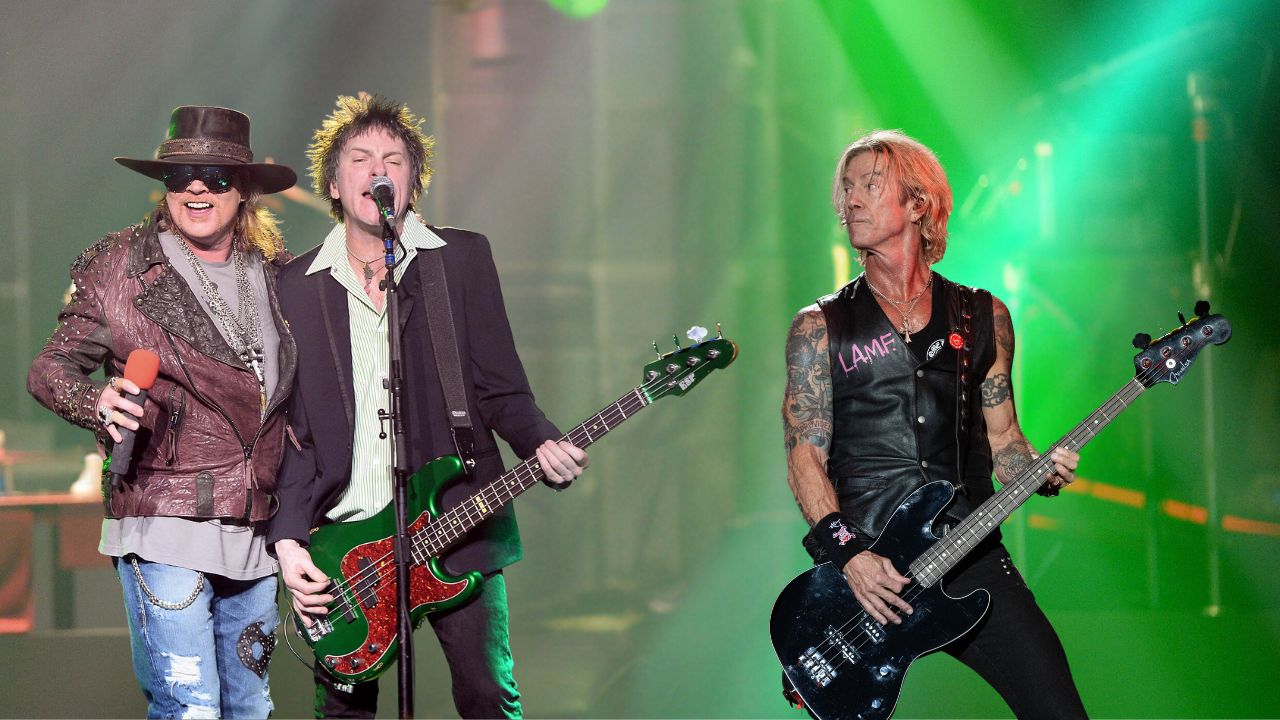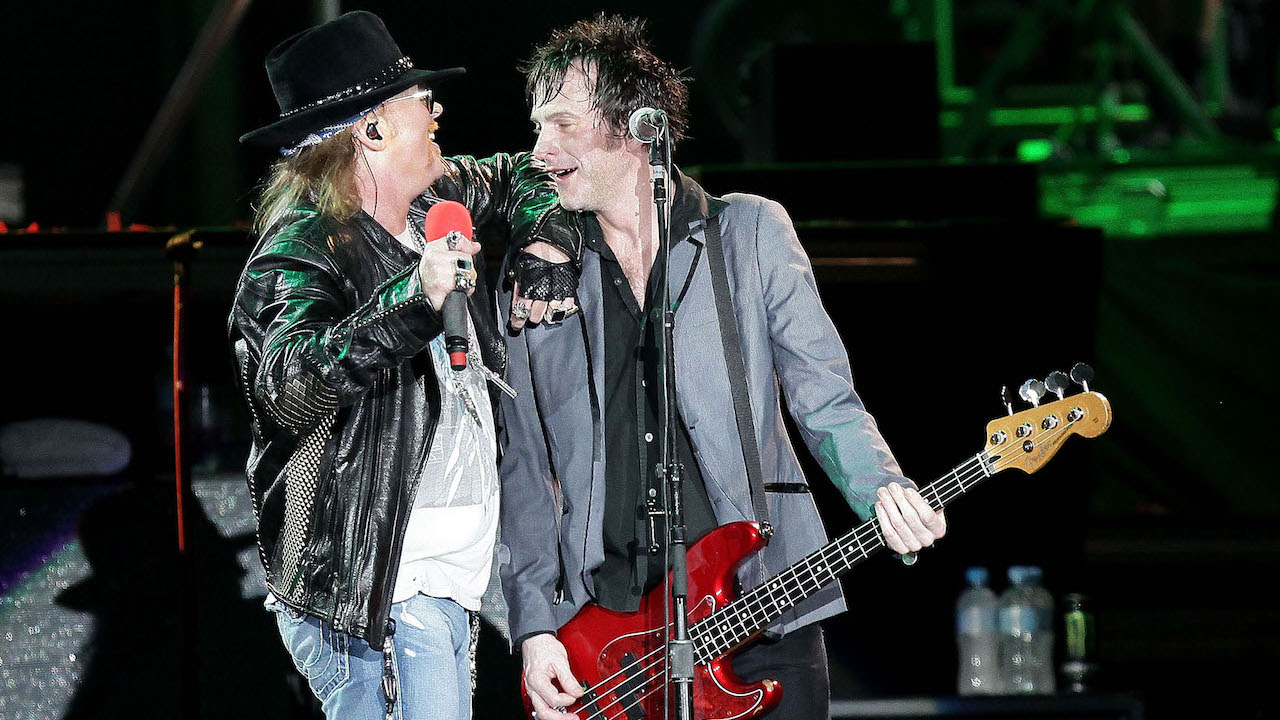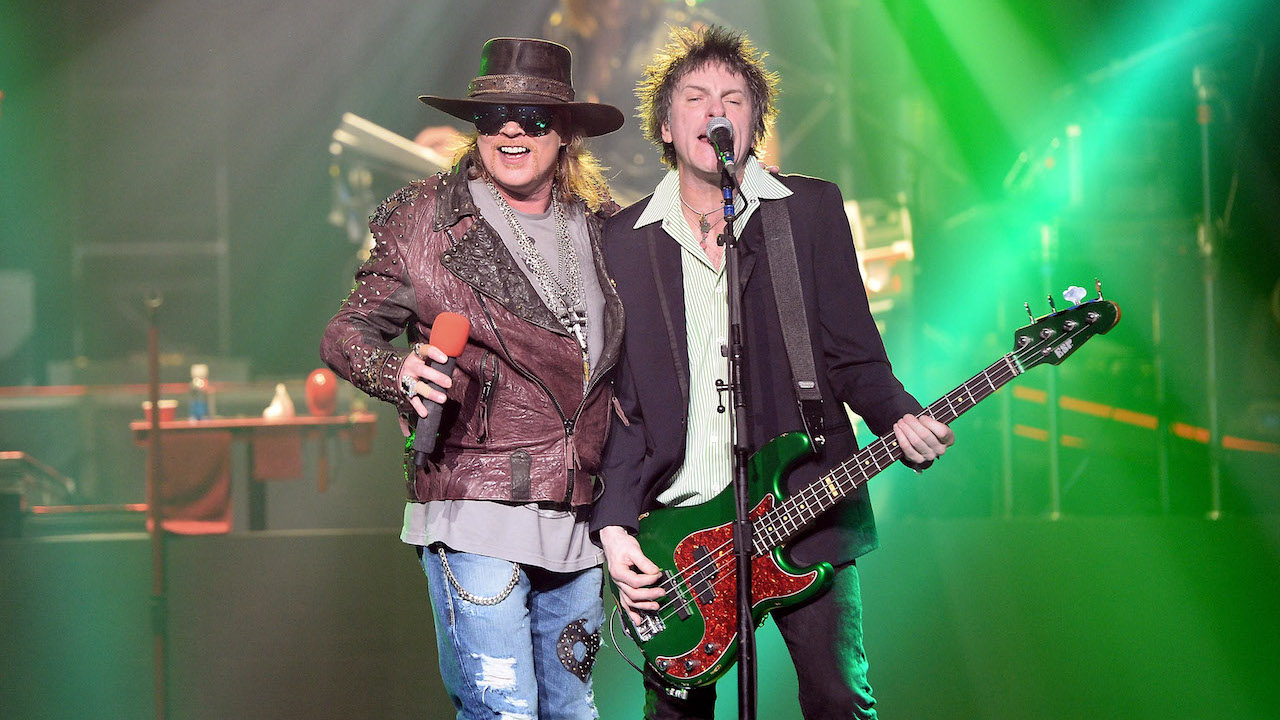
If you think Tommy Stinson landed the world’s easiest gig when he joined Guns N’ Roses in 1998, you’ve got another thing coming. Sure, playing a handful of gigs and recording little more than a song a year may not sound like much. Add a healthy salary retainer and infrequent rehearsals, and it begins to sound better than even the cushiest corporate engagement. But make no mistake: being the bassist in Guns N’ Roses takes work. Case in point: Chinese Democracy.
The follow up to Guns N’ Roses’ 1993 effort, The Spaghetti Incident?, the record's extreme budget ($13 million) and absurd incubation period (10 years) made it the butt of many jokes. But behind the scenes, things weren't so funny.
“Chinese Democracy was unlike any other record I've made – or would want to make again,” Stinson told BP. “The only thing I could grasp is that I had the kind of punk-rock attack that Duff did. I wouldn't be afraid to say I stole some of his stuff, but the whole thing was an exercise in patience. It got to be really dumb.”
A rotating cast of drummers and guitarists and unhealthy record-label relations turned the production into a nightmare, and Stinson was there on the sidelines.
Speaking to Bass Player in April 2009, Stinson took a second to talk Guns, gear, and what went into making Chinese Democracy.
How did you get the gig with Guns N Roses?
“My friend Josh Freese was playing drums with the band. I ran into him in a Hollywood rehearsal hall, and he mentioned that Duff had quit. Then he asked if I knew any bass guitar players. We just kind of laughed about it, because it sounded like a funny thing for me to go audition. Guns N' Roses were never my thing when the band first came out – they just weren't my style. I thought at least it would be fun to play with Josh. I learned five or six songs for the audition, but we basically just jammed, and it was pretty fun. They seriously needed a bass player, so they asked if I'd do it.”
Do you and Duff know each other?
“I met him a few years back. and he seemed like a really sweet guy. He wasn't really a metal guy – he had punk roots. He didn't seem to have any issues with me – I just don't think he wanted the gig anymore.”
Describe the writing process for Chinese Democracy.
“I came in around 1998, when the band was still writing the record. It was Paul Tobias and Robin Finck on guitar, Dizzy Reed and Chris Pitman on keys, Josh on drums, and me. Everybody was just slowly starting to bring in ideas.”

“We were set up at Rombo Recorders, a big studio out in the middle of nowhere. A funny thing – Captain & Tennille owned it. The whole thing looks like a boat. Anyway, we all just started hammering ideas out. Essentially it was eight guys collaborating, and to be thrown into that kind of environment – eight guys from very different walks of life – was very crazy. I'd never worked in that way.”
How did you work out your ideas in a civil way?
“We each had to give reasons for liking or disliking something – you couldn't just be bullheaded. We had to function as a democracy, or we'd end up hating each other. Collaborating was good for that. I think every one of us learned from it.”
When it came time to track the bass, was there still that spirit of collaboration? Or were you left to your own devices?
“We were all left with our own devices to come up with individual instrument parts. The broader song ideas had to be hammered out.”
Street of Dreams stands out for having cool, counter melodic bass work.
“That's one of the places where I tried to play melodically. Axl had the majority of that song written, and I brought in the bridge bassline and progression.”
It has a few licks that seem to reference Duff's playing, was that intentional?
“When I started hammering out those Guns N’ Roses songs, I started to really dig into what Duff was doing – I really liked the stuff he played. I'd be lying if I said his playing didn't seep into my subconscious - like the way he uses grace notes.”
Josh Freese left Guns N' Roses in 2000 and was replaced by Brian Mantia. What did that mean for the tracks you had recorded with Josh?
“I had to redo them. I probably ended up completely re-recording each part five or six times over the years. It was tough. What really happened was the record company stood back and left Axl to his own devices. Axl had all these ideas, and he needed somebody to help interpret what he wanted. He had to basically produce himself, and that's not what he went into this wanting to do. There are a lot of reasons the album took so long to make, but I think the record company really dropped the ball.”
What do you see as the root cause for that?
“I think everything changed when Geffen merged with Interscope. When that happened, Axl was told that A&R Executive Jimmy Iovine would play more of a role in making the album happen. What Jimmy did instead was throw other people into the mix who weren't very capable.”
What happened when producer Roy Thomas Baker was brought in?
“He wanted to re-record everything, because he felt he could get better tones. In my opinion, he wasted many years and many millions of dollars trying to get us better sounds that we could have addressed in the mixing stage. I'm not a proponent of his style of producing. I think Iovine put Roy Thomas Baker in the producer seat because he didn't think the raw sounds were good enough. Then Roy came in and would try every Marshall guitar amp in a five-state area to find the right guitar tone. And he wanted to do that for every part of the album.”

What amps did you use for Chinese Democracy?
“A 1x15 Matchless combo that's a great-sounding bass amp – real dirty and beefy. We'd usually mix that with a DI signal.”
Which amps did you like to use live?
“Around the time we played the Rock in Rio festival in 2001, I was using SWR amps. We were gearing up for a massive production, and I thought, if I'm going to be playing for 300,000 people, I should probably have a big amp! I bought three Megoliath 8x10 cabinets, six Big Bertha 2x15 cabinets, two Mo’ Bass heads and a power amp. It sounded great. We had dress rehearsals and all, and then we found out we were going to use in ear monitors! Of course, the reason we're using in-ears is so Axl can hear himself sing. One of his biggest problems with the old band was that they were louder than hell, and he could never hear his vocals on stage. Well, we didn't really know that until we got down to Rio. Here we are with this big wall of amps, all turned down to one or two.”
What was that Rio gig like?
“Crazy. The only thing anyone could hear in our in-ears was the sound of the crowd coming through Axl’s was vocal mic. It was like a jet engine. After that, I did make use of the 8x10s since the cabinets had a low end that translated well when mic’ed. For most of Chinese Democracy, I used a DI, my Matchless amp, and the SWR as my big loud amp.”
“After I realised our stage volume had to be a lot quieter, I had to make some real adjustments. I ended up talking to Ampeg, who was doing a reissue of the flip-top B-15 1x15 combo – all hand-wired and really nice. Now I put those behind the stage and crank them – they sound awesome - running that sound to my in-ears and the front of house. I keep a couple of Ampeg 8x10 cabinets onstage at a low volume, just to get a little low-end.”
Did you modify your Fenders?
“I did. I've always used EMG pickups. They give me a lot of growl and grit when they hit the preamp of an SVT.”
How did you come to prefer a PJ pickup configuration?
“I started doing that when I got the Guns N’ Roses gig. I figured Duff played that kind of bass, so I should use something similar to try to match that sound.”
What other gear have you been using?
“This is the only band where I've been able to play a Gibson Thunderbird. I used to have a ’63 Thunderbird that I loved, but it just broke too many times. I used a new Thunderbird on the song Chinese Democracy. I also played a StingRay on a few tunes. The StingRay didn't sound right for the older Guns material, but I liked the tone for some of the newer stuff, like Better. It's great for drop-tuned stuff.”
“Until recently, I never really cared about basses except that they work, but lately, I've gotten the idea of finding the right tone for the right song. I've really gotten into Hofner Beatle basses, because they do something that no other bass does. I have two ‘67s, one's beat up and the other one's clean. They're a blast to play, but I could never use them with Guns. If you want to know how manly Paul McCartney was, check out those old Hofners. Those have a lot of low end!”







